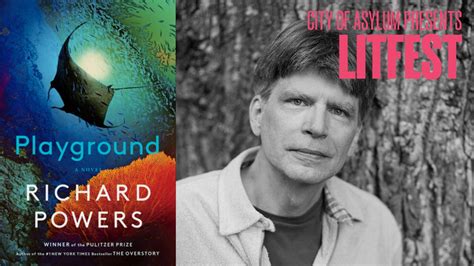has been hailed as one of the most innovative and provocative writers of his generation. With a career spanning over three decades, Powers has consistently pushed the boundaries of literary fiction, exploring the intersections of science, technology, philosophy, and art. His novels are known for their complex characters, lyrical prose, and unflinching examination of the human condition.
One of the defining features of Powers’ work is his ability to blend disparate disciplines and genres, creating a unique fusion of science, philosophy, and literature. His novels often incorporate elements of biology, physics, and mathematics, reflecting his own interests and obsessions. For example, his novel “The Gold Bug Variations” (1991) explores the intricacies of molecular biology and the search for meaning in a postmodern world. Similarly, “The Time of Our Singing” (2003) delves into the world of physics and the nature of time itself.
Powers’ writing is also characterized by its lyricism and poetic precision. His prose is often described as “musical” and “evocative,” with a keen attention to detail and a deep understanding of the natural world. In “The Overstory” (2018), for instance, he uses the language of forestry and ecology to explore the intricate relationships between humans and the environment. This novel, which won the Pulitzer Prize for Fiction in 2019, is a sweeping narrative that spans centuries and continents, examining the complex web of relationships between trees, humans, and the natural world.
In addition to his literary innovations, Powers is also known for his willingness to tackle difficult and complex subjects. His novels often grapple with pressing issues such as climate change, genetic engineering, and the ethics of scientific inquiry. For example, “Gain” (1998) explores the consequences of corporate greed and the exploitation of natural resources, while “Orfeo” (2014) delves into the world of bioterrorism and the intersection of art and science.
Powers’ work has been widely praised by critics and scholars, who have noted his unique blend of intellectual curiosity, literary skill, and philosophical insight. As novelist and critic Margaret Atwood has observed, “Powers is a writer of immense intellectual curiosity and range, and his novels are always intensely engaging and thought-provoking.” Similarly, scholar and critic Frederick R. Karl has noted that Powers’ work is characterized by “a sense of wonder, a sense of awe, and a sense of mystery,” which are rare qualities in contemporary literature.
Despite his many accolades, Powers remains a somewhat elusive figure, preferring to focus on his writing rather than seeking the spotlight. However, his influence on contemporary literature is undeniable, and his novels continue to inspire and challenge readers around the world. As a writer, he embodies the spirit of intellectual curiosity and creative experimentation, pushing the boundaries of what literature can do and exploring new ways of thinking about the world and our place within it.
One of the key aspects of Powers' work is his ability to balance intellectual complexity with narrative accessibility. His novels are often described as "brainy" and "challenging," but they are also deeply engaging and emotionally resonant. This balance between intellect and emotion is a hallmark of Powers' writing, and it has earned him a reputation as one of the most innovative and exciting writers of his generation.
In terms of his literary influences, Powers has cited a wide range of authors and thinkers, from Charles Darwin and Albert Einstein to James Joyce and Virginia Woolf. His work reflects a deep engagement with the scientific and philosophical traditions of the Enlightenment, as well as a keen awareness of the literary and artistic movements of the 20th century. At the same time, however, Powers is a deeply original writer, and his novels are characterized by a unique blend of style, structure, and theme.
What are some of the key themes and motifs in Powers' work?
+Powers' work often explores themes such as the intersection of science and art, the nature of time and memory, and the human relationship with the natural world. His novels also frequently incorporate motifs such as music, mathematics, and the search for meaning in a postmodern world.
How does Powers' use of scientific and philosophical concepts contribute to the literary value of his novels?
+Powers' incorporation of scientific and philosophical concepts adds depth, complexity, and intellectual curiosity to his novels. It also allows him to explore pressing issues and questions of our time, such as climate change, genetic engineering, and the ethics of scientific inquiry.
What are some of the key literary influences on Powers' work?
+Powers has cited a wide range of literary influences, from modernist writers such as James Joyce and Virginia Woolf to scientific and philosophical thinkers such as Charles Darwin and Albert Einstein. His work reflects a deep engagement with the literary and intellectual traditions of the 20th century, as well as a keen awareness of the scientific and philosophical developments of our time.
In conclusion, Richard Powers is a novelist of immense intellectual curiosity, literary skill, and philosophical insight. His work is characterized by a unique blend of science, philosophy, and art, and his novels are known for their complex characters, lyrical prose, and unflinching examination of the human condition. Through his writing, Powers continues to challenge and inspire readers, exploring new ways of thinking about the world and our place within it.
One of the key takeaways from Powers' work is the importance of interdisciplinary thinking and creative experimentation. His novels demonstrate the value of combining disparate disciplines and genres, and they challenge readers to think beyond the boundaries of conventional knowledge and understanding.
Ultimately, Powers’ work is a testament to the power of literature to inspire, educate, and transform us. His novels are not just works of fiction, but also works of intellectual curiosity and creative exploration, reflecting a deep engagement with the scientific, philosophical, and artistic traditions of our time. As we continue to navigate the complexities and challenges of the 21st century, Powers’ work reminds us of the importance of imagination, creativity, and intellectual curiosity in shaping our understanding of the world and our place within it.



